Step 11: Keeping Conscious Contact
With Step 10, we put in place a number of strategies that—with the help of God—will allow us to maintain healthy and effective relationships with our fellow travelers on planet Earth.
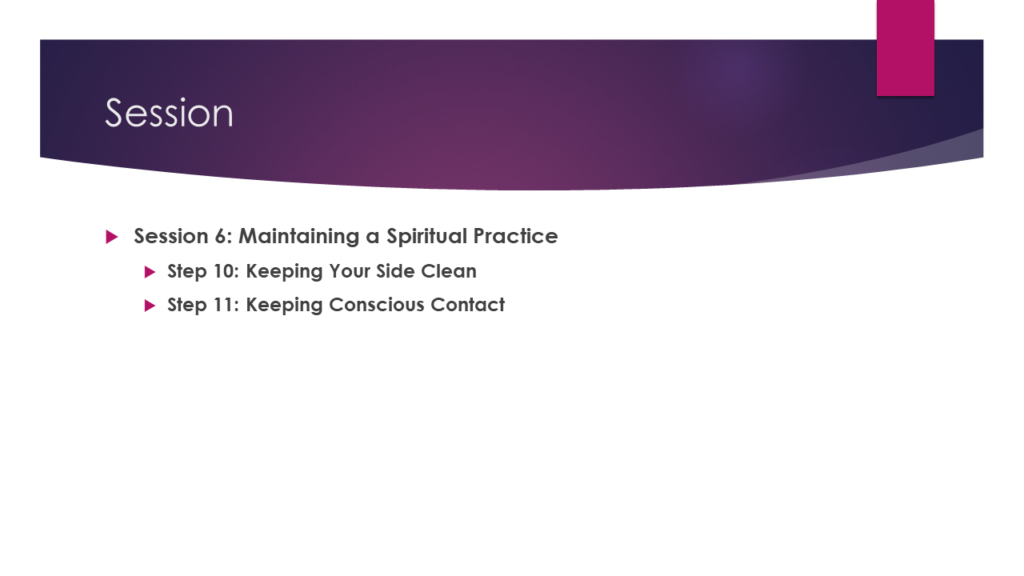
As the psalmist once wrote, “Our help is in the Name of the Lord.” In Step 11, we will suggest strategies that will allow us to maintain the essential interconnectedness with that Higher Power on which we must rely for relief from our spiritual illness and continued health of mind, heart, and soul. Here is Step 11.
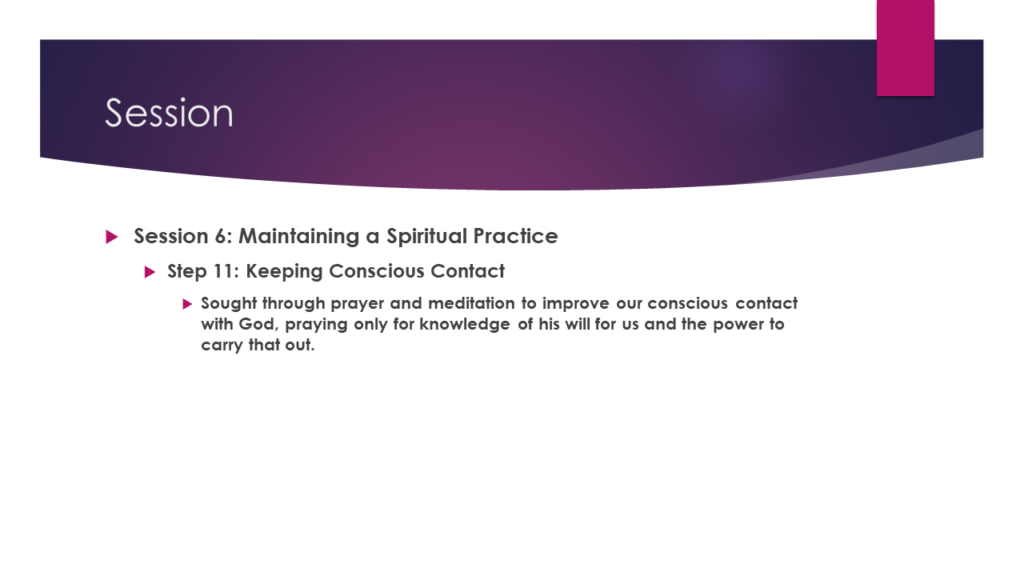
“Sought through prayer and meditation to improve our conscious contact with God, praying only for knowledge of his will for us and the power to carry that out.” Here’s a big question posed by many people: Does our concept of God matter?
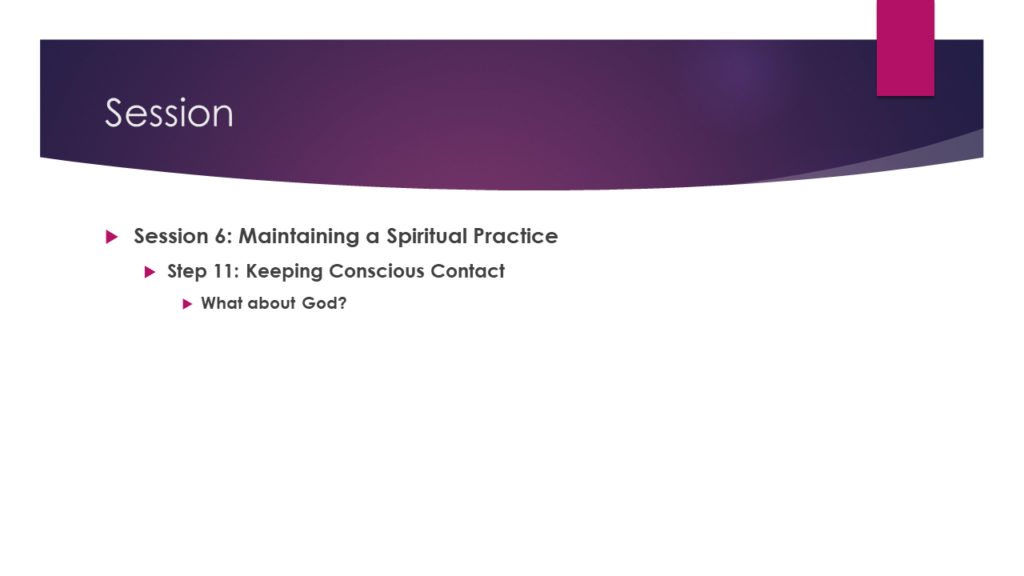
On one hand, we could say no, it doesn’t. People rightly rebel at the descriptions of God that are rampant in our world, such as the bearded white man on a throne. It is an absolute fact that no human concept, let alone human language, can adequately convey God’s being. All human language is analogical. There is an approach called negative theology which teaches that for anything one may say about God, the opposite is equally true. For example, even saying “God exists” is questionable, because God’s existence is unlike any other being in the universe. When we speak of God, we have no idea of what God’s “existence” means. In that sense, it’s meaningless to say that God exists. And yet, we experience an interconnection with something transcending ourselves and our world. What are some approaches to that “something”?
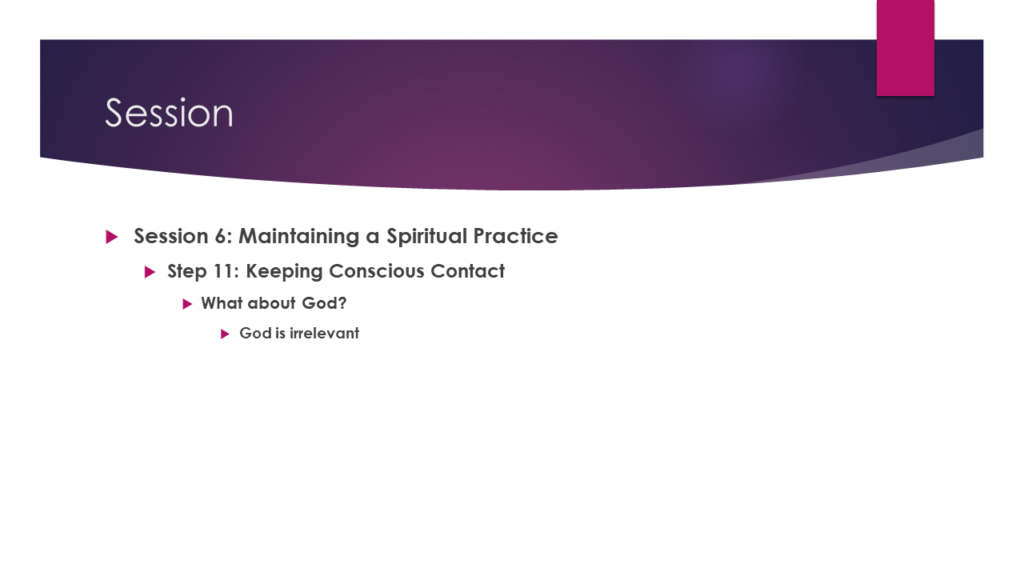
Some people reject God talk entirely. That is a perfectly reasonable approach to the subject. They are right that attempting to define God is a fool’s errand. It’s possible to say, quite authentically, “I sense there’s something out there, but I’m not prepared to say what it could be. All I know is that it’s not God in the traditional sense.” We have to ask ourselves, though, where’s the misunderstanding? Did the ancients misunderstand God, or are people misunderstanding the ancients? Are we so caught up in scientific, experiential ways of thinking that we’ve lost touch with analogy and poetry? All we can say for sure is that, if God is truly irrelevant, then we’re lost because, on our own, our lives are certainly unmanageable.
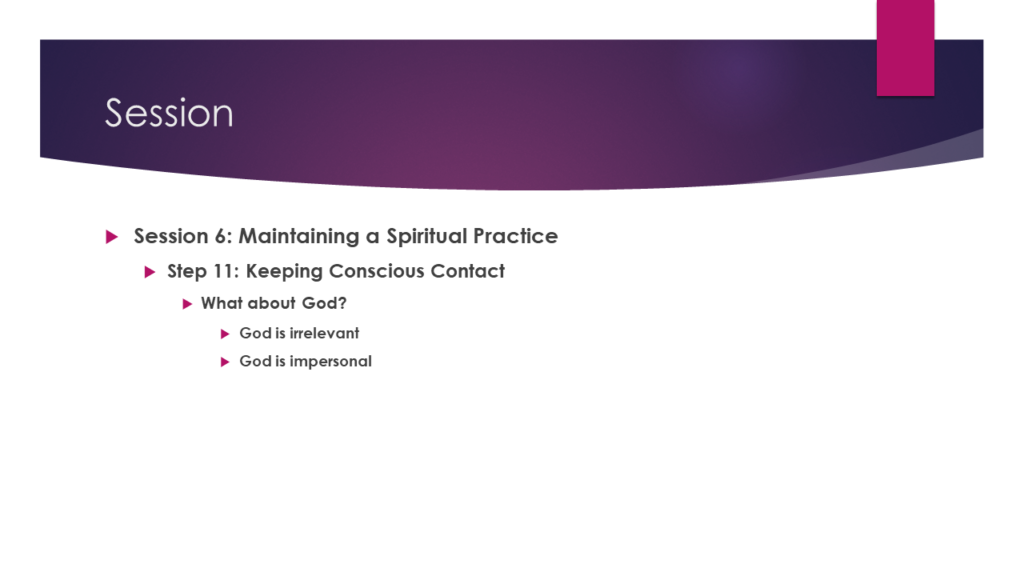
All right. Perhaps we can accept that there exists an unimaginable Power greater than ourselves. The universe fills the bill. All that exists is part of and emerged from that universe. People today are very fond of talking about how the forces of nature produce this or that. We can trace evolution all the way back to the Big Bang. And yet, as we pointed out in one of our earlier sessions, life and human consciousness are part of that universe. They aren’t separate. We aren’t somehow floating above and apart from the universe as impartial observers. We’re part and product of the soup. If we are alive, then a fortiori, the universe is alive. And if we are conscious, then a fortiori, the universe is conscious. It is possible to identify God with the universe, so long as we spell it with a capital “U.” If the Universe is personal (that is, alive and conscious), then so must God be.
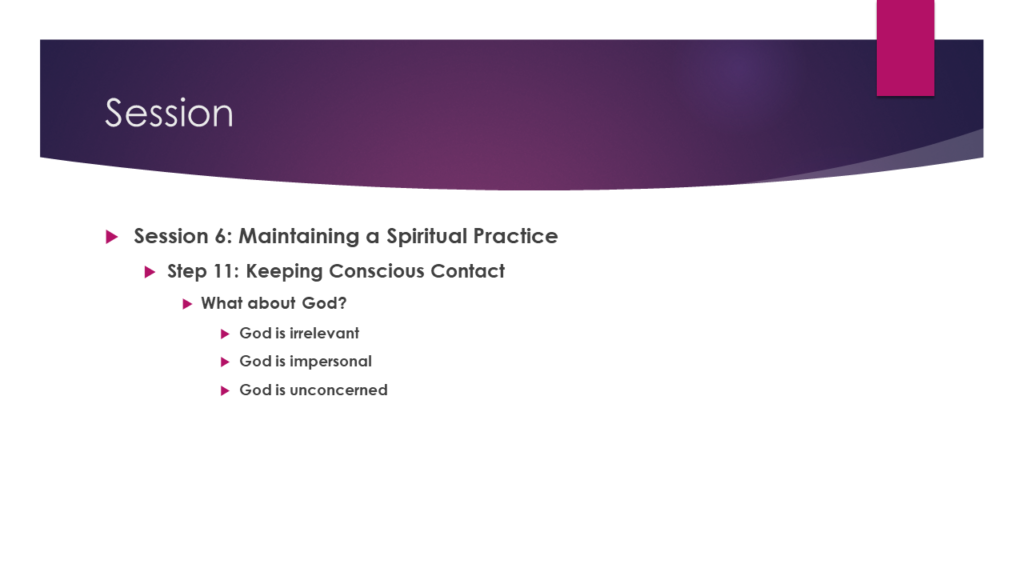
The Deists of the eighteenth century accepted a living, conscious Power that set the universe in motion. However, their deity was unconcerned with human affairs. We often hear it said that God’s too “busy” to concern himself with people. But we have to ask, what kind of universal Consciousness would be unconcerned with the beings who share the same life and consciousness? Does an unconscious Consciousness make any sense at all? And what about our need for Power to overcome the unmanageability of our lives? Haven’t we established that our only way out of the spiritual illness is to turn our will and lives over to that Power? Are we prepared to trust and to surrender to a God who doesn’t give a damn? Perhaps we’d better think again.
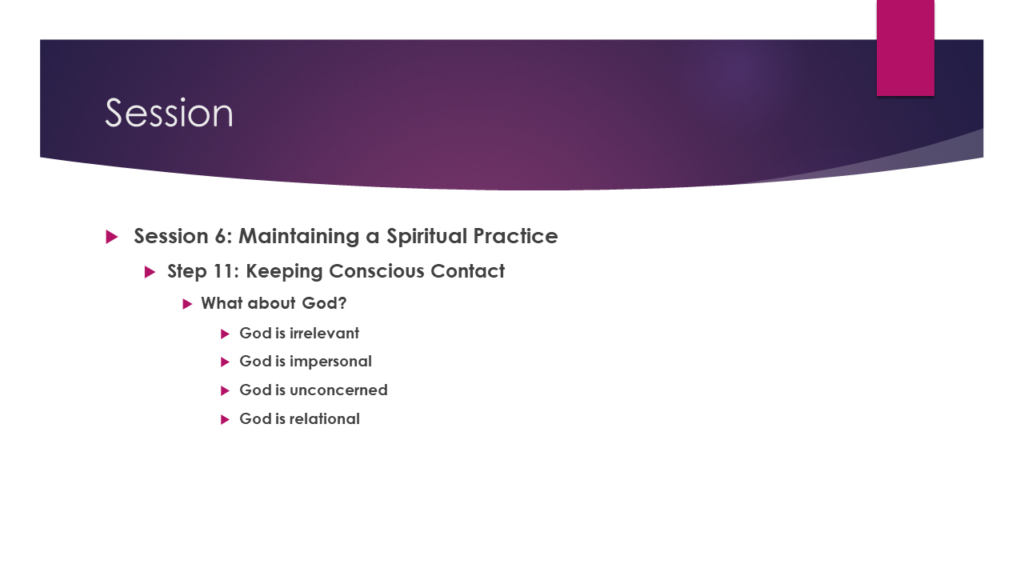
We’ve been proceeding from square one with the understanding that our first and foremost job to achieve spiritual growth is to establish an interconnection with God. Throughout all our sessions, I’ve used the terms “interconnection” and “interrelation” because these connections and relationships between us and God, between us and our higher selves, and between us and others must be two-way channels. How do we imagine we’re going to be able to establish a relationship with a Higher Power that is not relational? If we are to have a relationship with God, it has to be I-Thou, and not I-It. It has to be interpersonal. Even those who have claimed to have a spiritual life and yet profess to be atheists have described to me their interrelationship with some sort of great beyond. They won’t call it God, but that doesn’t change the reality of their experience at all. What works for them is their interrelationship with it.
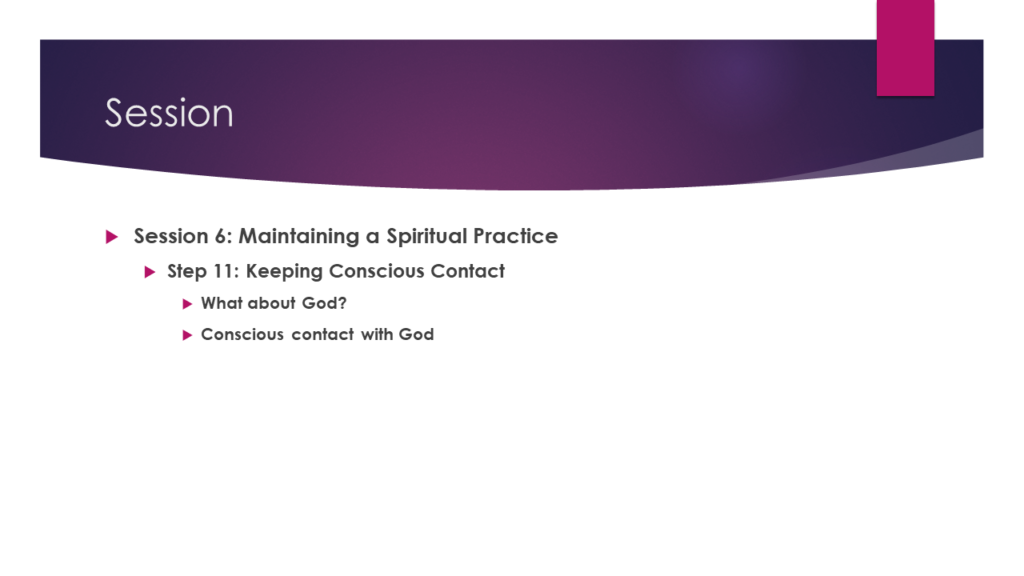
How does one maintain a relationship without any contact with the other? Won’t the relationship falter? There needs to be at least minimum contact to keep the lines of communication open. If that’s true among humans whom we can see and hear and touch, how much more so with God? Since the entirety of our spiritual life is dependent on our interrelationship with God—as we learned in the first three steps—then maintaining active contact with God would seem to be of primary importance. There are three ways we can accomplish this: prayer, meditation, and contemplation. We’ll talk a little about all three.
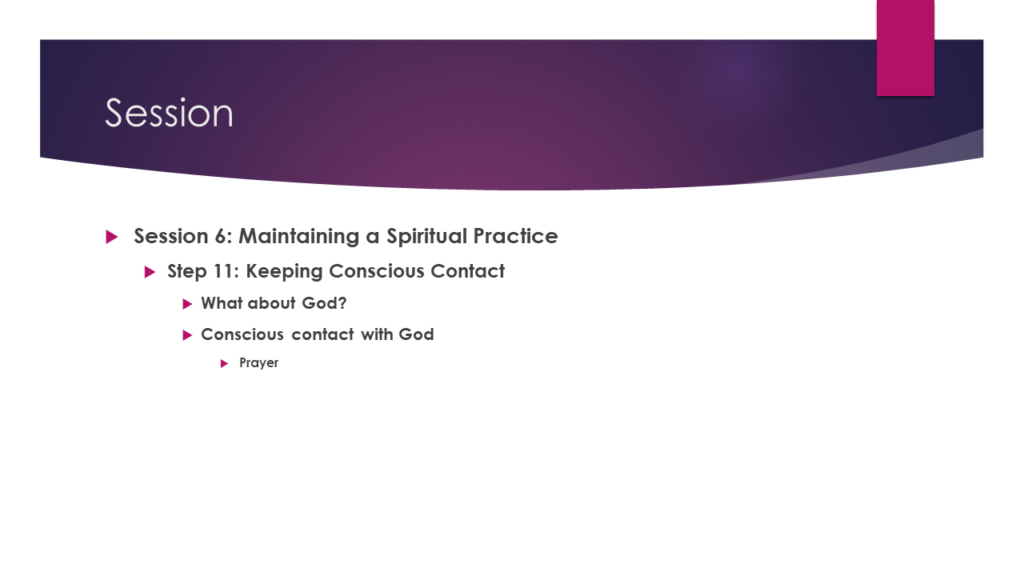
Let’s start with prayer. The traditional definition of prayer is, “lifting up the mind and heart to God.” Prayer, like any conversation, is primarily a mental exercise. Silently or aloud, we use words to convey our meaning to our Higher Power. In prayer, we talk to God, doing all the things that we are accustomed to doing when we converse with our friends. We tell, we ask, we complain, we give thanks. Many people think that praying consists only in saying prayers: that is traditional formulas can be repeated as needed. Other people think that’s a silly waste of time. However, if that’s you, think again. If God is truly God, then God has no need to hear anything we have to say. In fact, since God must be timeless, God knows what you’re going to say before you even think it. Why bother, then? Because, like spending time with friends, the real gifts that you bring to God in prayer are your time and effort. Those gifts to God are what serve to grow your conscious contact. The words are useful but unimportant. It’s your time and energy in saying them that genuinely matters,
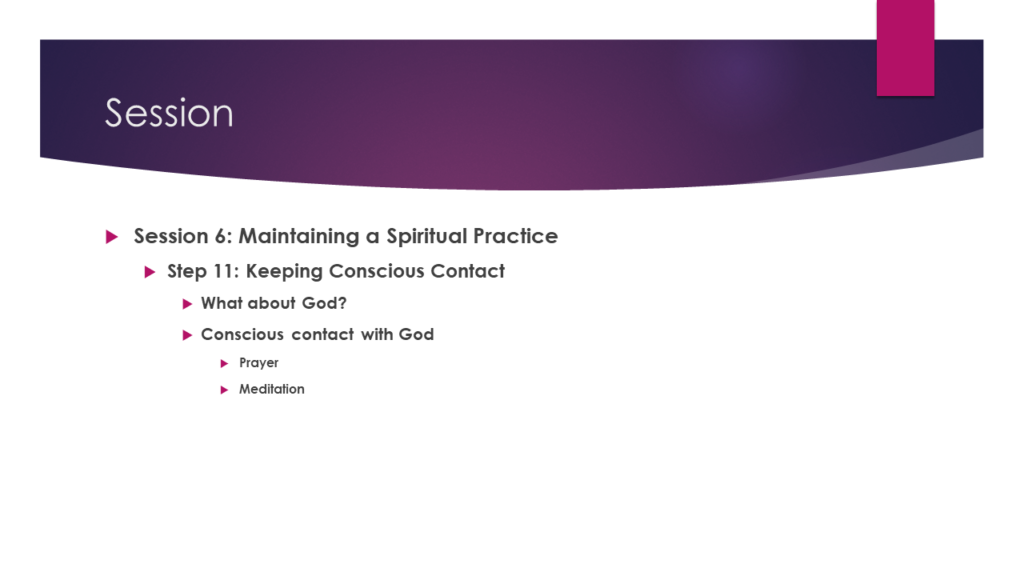
How about meditation? We hear a great deal about the benefits of meditating. Meditation promotes physical, mental, and emotional health. It’s worthwhile doing, even when God’s not consciously involved. But the real reason we meditate is for the spiritual benefits. From a spiritual perspective, meditation is like spending time with a dear friend. What turns ordinary meditation into a spiritual connection? Once again, it’s our intention. Prayer, of all sorts, is in the will. It happens whenever we decide it’s going to happen for us. It’s a good idea, before starting meditation to set our intention using formal prayer. For example, “Dear God, I’m here. I want to spend the next little while with you.” That’s sufficient. That’ll do the trick. Classic meditation starts with an image or a scene and we allow our minds to enter that scene and wander about, keeping our focus as much as possible on those images that make us feel closest to God. Meditation is an exercise of the heart more than the mind. It’s like paying a visit to a mental shrine—a kind of place where we feel that we’re at home with God.
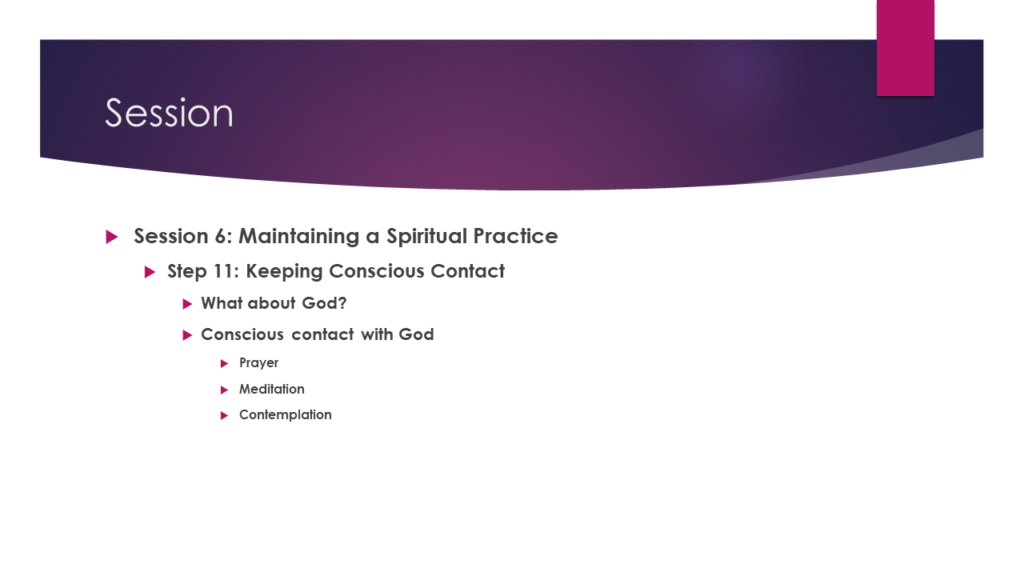
There is a third approach to prayer that’s less well-known compared with prayer and meditation. Contemplation—also called “listening prayer” or “centering prayer”—is a wordless, imageless connection to God. The methodology is similar to what has been taught as “transcendental meditation.” It consists of spending quiet alone time focusing on a repetitive rhythm. That can be your own breathing or a prayer-phrase or a mantra. That’s the basic methodology (there’s much more to learn if you care to take the time to study and practice it). What makes it prayer is the same thing that applied to meditation: a brief prayer at the beginning, setting our intention to be a personal connection with God. Once again, prayer is in the will to pray and the gift of our time and energy, not in the words or the images.
Just a word about a traditional prayer form that has gone out of style called the Rosary. The Rosary consists in reciting formal prayers—mainly the “Our Father” and the “Hail Mary”—while meditating on scenes from the Bible. The prayers are repeated rhythmically so that your mind and heart are open to listening to the whisperings of the spirit of God. In this sense, all three types of prayers are in play: formal prayer, meditation, and contemplative listening prayer. For those so inclined, the Rosary might merit another look. Now, what should we pray for?
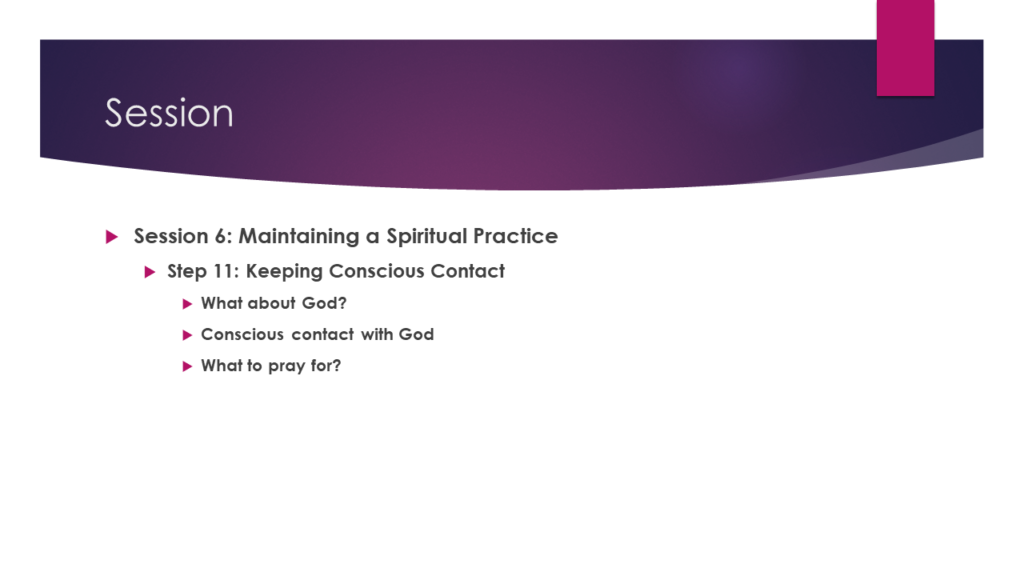
I’ll let you in on a little secret—the more frequent and regular your prayer time, the less you’ll be concerned with praying for anything. Remember powerlessness? If spiritual growth has taught you anything, it would be that we’re not in control, we don’t know what’s best for anyone else, and to be truthful we don’t know what’s best for ourselves, either. You’ll find that letting go and letting God applies equally well in the realm of prayer. Conscious contact does not necessarily mean asking for anything at all. The tenth step even tells us what to pray for: knowledge of God’s will for us, and the power to carry that out.
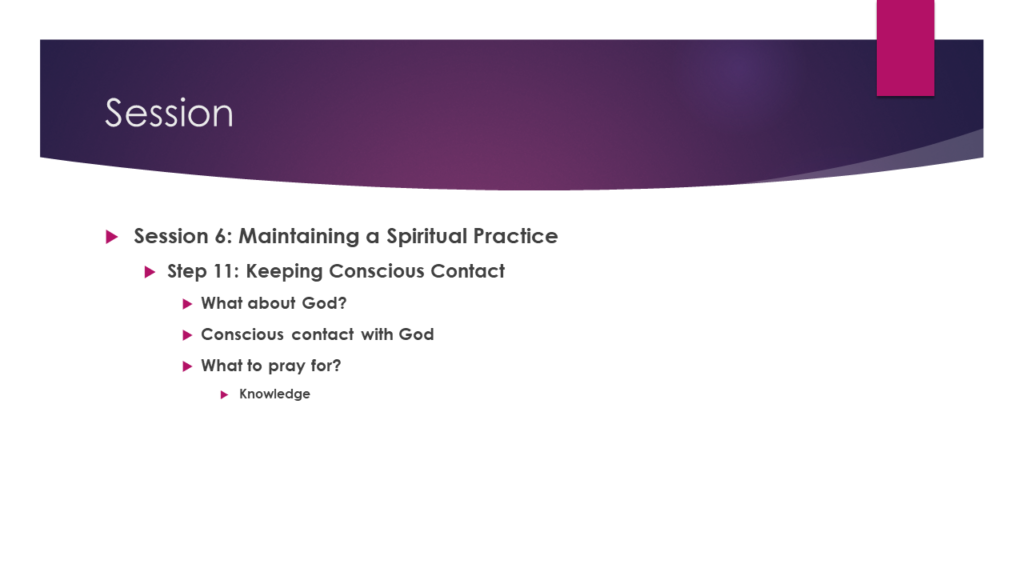
Accepting our powerlessness means turning our will and our lives over to the care of God. It means letting go of all our expectations since we’re not in control of our own destinies. Yet, we are required to act in this world. We need to do something to move forward. We’re not monks. We live and move and interact with the world. What should we do in any given situation? Wise people tell us to do the “next right thing.” But that’s the question, isn’t it? What is the next right thing? How do we know? That’s where this prayer comes in: “God, grant me the knowledge of your will for me.” Show me the next right thing to do. Show me the next compassionate thing to do. Show me the next loving thing to do. Now that’s a prayer worth praying! Then we trust that God will answer our prayer. What if we make a mistake and misjudge God’s will for us? So what? We learn from our mistakes. God rewards honest mistakes with experience and wisdom. As Saint Augustine once wrote, “Pray as though everything depended on God. Work as though everything depended on you.”
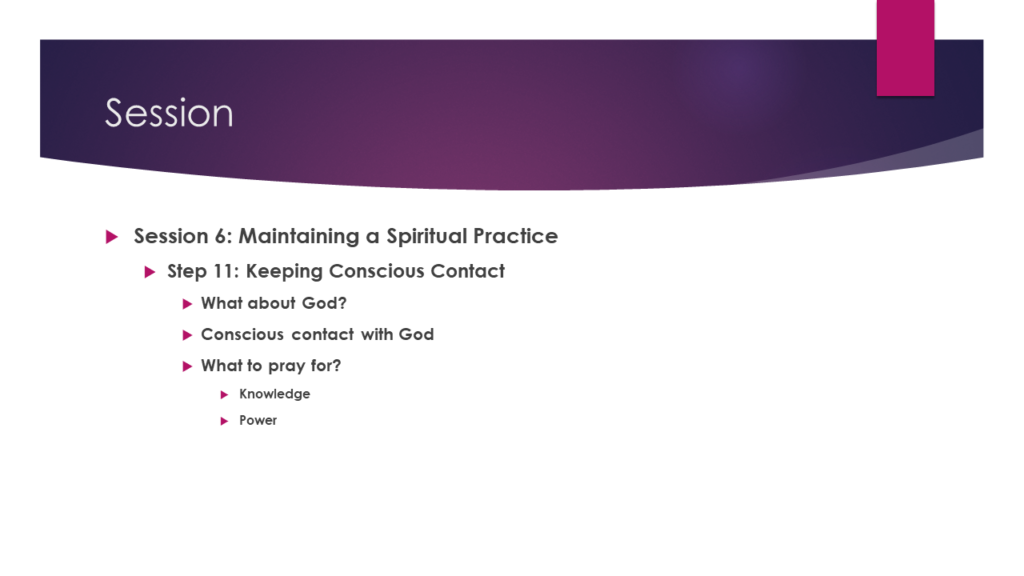
The second half of the prayer is equally important. Since we are powerless, the greatest gift we seek from God is the Power to do God’s will. If our wills are actually surrendered to God, then we become a channel of God’s power. God’s power through us is not like earthly power. It’s different. Saint Francis of Assisi understood that when he composed this famous prayer: “Lord, make me an instrument of your peace: where there is hatred, let me sow love; where there is injury, pardon; where there is doubt, faith; where there is despair, hope; where there is darkness, light; where there is sadness, joy.”
How should we pray? The answer to that question is as varied as there are people asking it. I can’t tell you how you should pray, but here’s what works for me. My contemplative prayer time is precious to me. It sets the tone and inspires me for the entire day. I get up early…before the sun. I do this deliberately so that I am surrounded by the peace and quiet of darkness before the world awakens. I do the minimum possible to make myself comfortable. I then go to my quiet place. I never disturb myself with any forms of external communication at all. I approach my contemplative prayer without any expectations nor anticipating any results. That prayer takes a minimum of twenty minutes. I then spend another half hour in formal prayer. Many people use that time for spiritual reading or praying other traditional prayers. Only then do I start my breakfast and my day.
I do pray at various times during the day, especially when I’m being challenged by outside events. A favorite prayer to use during these times is the Serenity Prayer: “God grant me the serenity to accept the things I cannot change, courage to change the things I can, and the wisdom to know the difference.” I try to keep in mind that the things I cannot change are all outside my skin, whereas the things I can are inside. I pray that God constantly remind me which is which.
Finally, at the end of the day, I kneel before my bed as a reminder of who I am before my God. I generally do a brief informal tenth step, and then end with a prayer of gratitude. Gratitude is the only thing that I have that is exclusively mine to offer to my God. All else has been given me. That’s why I end my day with a prayer of thanksgiving. It’s a good thing to be reminded of my dependence on a Power greater than myself.
That’s it. That’s the tenth step. I promise you, if and when you practice the tenth step faithfully, your life will be energized. Try it. You’ll see. What is it like to live an energized life? We’ll take a look at that when we cover the last step, Step 12.
